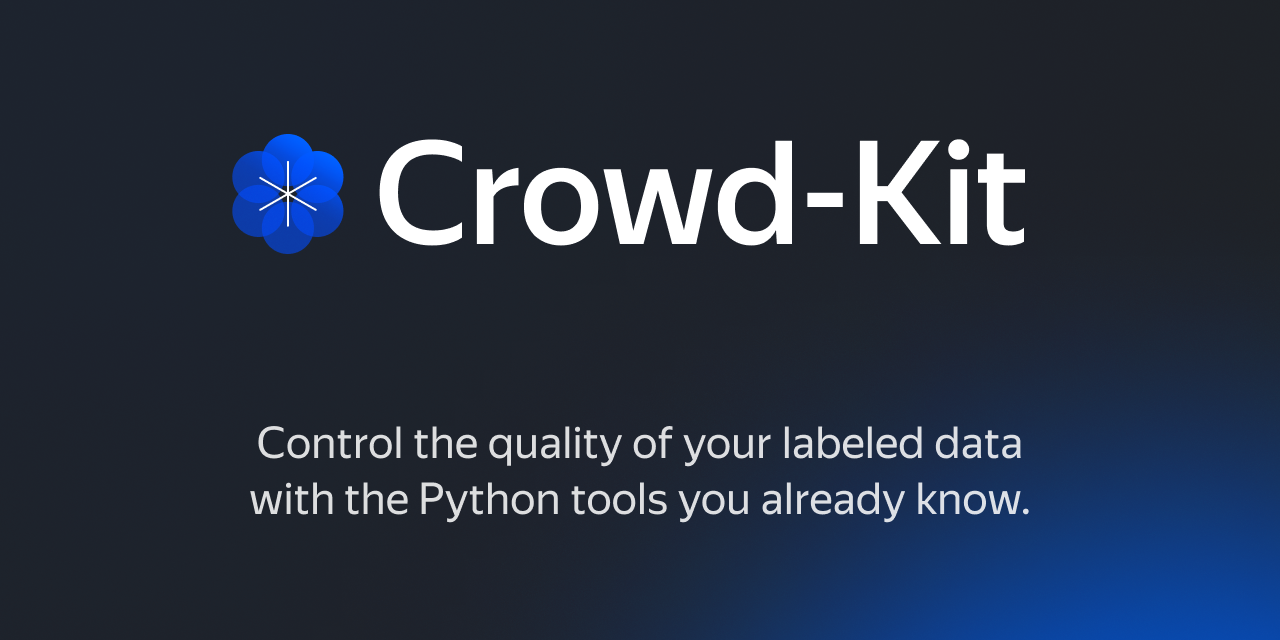Crowd-Kit is a powerful Python library that implements commonly-used aggregation methods for crowdsourced annotation and offers the relevant metrics and datasets. We strive to implement functionality that simplifies working with crowdsourced data.
Currently, Crowd-Kit contains:
- implementations of commonly-used aggregation methods for categorical, pairwise, textual, and segmentation responses;
- metrics of uncertainty, consistency, and agreement with aggregate;
- loaders for popular crowdsourced datasets.
Also, the learning subpackage contains PyTorch implementations of deep learning from crowds methods and advanced aggregation algorithms.
To install Crowd-Kit, run the following command: pip install crowd-kit. If you also want to use the learning subpackage, type pip install crowd-kit[learning].
If you are interested in contributing to Crowd-Kit, use Pipenv to install the library with its dependencies: pipenv install --dev. We use pytest for testing.
This example shows how to use Crowd-Kit for categorical aggregation using the classical Dawid-Skene algorithm.
First, let us do all the necessary imports.
from crowdkit.aggregation import DawidSkene
from crowdkit.datasets import load_dataset
import pandas as pdThen, you need to read your annotations into Pandas DataFrame with columns task, worker, label. Alternatively, you can download an example dataset:
df = pd.read_csv('results.csv') # should contain columns: task, worker, label
# df, ground_truth = load_dataset('relevance-2') # or download an example datasetThen, you can aggregate the workers' responses using the fit_predict method from the scikit-learn library:
aggregated_labels = DawidSkene(n_iter=100).fit_predict(df)Below is the list of currently implemented methods, including the already available (✅) and in progress (🟡).
| Method | Status |
|---|---|
| Majority Vote | ✅ |
| One-coin Dawid-Skene | ✅ |
| Dawid-Skene | ✅ |
| Gold Majority Vote | ✅ |
| M-MSR | ✅ |
| Wawa | ✅ |
| Zero-Based Skill | ✅ |
| GLAD | ✅ |
| KOS | ✅ |
| MACE | ✅ |
| Method | Status |
|---|---|
| Binary Relevance | ✅ |
| Method | Status |
|---|---|
| RASA | ✅ |
| HRRASA | ✅ |
| ROVER | ✅ |
| Method | Status |
|---|---|
| Segmentation MV | ✅ |
| Segmentation RASA | ✅ |
| Segmentation EM | ✅ |
| Method | Status |
|---|---|
| Bradley-Terry | ✅ |
| Noisy Bradley-Terry | ✅ |
| Method | Status |
|---|---|
| CrowdLayer | ✅ |
| CoNAL | ✅ |
- Ustalov D., Pavlichenko N., Tseitlin B. (2024). Learning from Crowds with Crowd-Kit. Journal of Open Source Software, 9(96), 6227
@article{CrowdKit,
author = {Ustalov, Dmitry and Pavlichenko, Nikita and Tseitlin, Boris},
title = {{Learning from Crowds with Crowd-Kit}},
year = {2024},
journal = {Journal of Open Source Software},
volume = {9},
number = {96},
pages = {6227},
publisher = {The Open Journal},
doi = {10.21105/joss.06227},
issn = {2475-9066},
eprint = {2109.08584},
eprinttype = {arxiv},
eprintclass = {cs.HC},
language = {english},
}Please use GitHub Issues to seek support and submit feature requests. We accept contributions to Crowd-Kit via GitHub as according to our guidelines in CONTRIBUTING.md.
© Crowd-Kit team authors, 2020–2024. Licensed under the Apache License, Version 2.0. See LICENSE file for more details.

